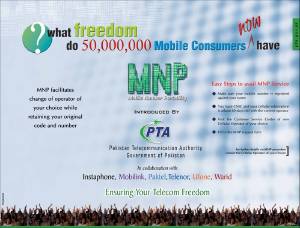 After many false starts mobile number portability (MNP) was implemented in Pakistan recently (March 23 to be precise). MNP allows users to switch mobile phone company while keeping their existing mobile number. MNP was one of the key items of Pakistan’s Mobile Cellular Policy of 2004.
After many false starts mobile number portability (MNP) was implemented in Pakistan recently (March 23 to be precise). MNP allows users to switch mobile phone company while keeping their existing mobile number. MNP was one of the key items of Pakistan’s Mobile Cellular Policy of 2004.
The implementation of MNP was a huge and expensive undertaking as it requires significant system changes and all phone companies have to agree to rules and tariffs for routing calls. Pakistan Telecom Authority (PTA) is the government agency which was responsible for overseeing the MNP initiative. In the beginning there was reluctance from the big mobile companies and PTCL and there were disagreements about the tariffs, which caused delays (see timeline below).
There are many possible reasons why users would want to switch providers – and of course most users like to keep their existing phone number when switching – therefore the term porting.
MNP is considered a major achievement for any mobile market and it is anticipated to shake things up in the already heated mobile market. In US for instance local phone number portability was implemented first around 1997 and Mobile number portability came fairly recently (Nov 2003) after mobile companies were mandated to do so by FCC, the US communications regulatory agency. Japan launched MNP in 2006 and experienced aggressive – even misleading – marketing tactics. India is still far away from MNP due to a number of technical and regulatory hurdles.
Research from Japan and India indicates that about 30% of subscribers would switch providers if they could keep their numbers. MNP poses many technical and administrative challenges for the operators but provides a fair and competitive landscape for consumers and operators. Usually MNP increases the potential of churn (loss of customers) thereby forcing service operators to work hard to retain their customers. Within a few months winners and losers will emerge in Pakistan.
- 2004: Cellular Telecom policy requires MNP implementation by Jan 2006.
- January 2005: PTA asks for Request for Proposals on Mobile Number Portability
- May 2005: All the six cellular mobile operators agree to form a Supervisory Board to implement Mobile Number Portability with the help of Pakistan Telecommunication Authority (PTA). Initial expenses on the implementation of MNP to be shared by the operators. A company named “Pakistan MNP Database LimitedÔ is set up with the specific purpose of facilitating the implementation of mobile number portability (MNP).
- June 2005: The Mobile Number Portability Regulations are placed for the information of all concerned and comments are requested from all stakeholders including general public.
- July 2006: Chairman PTA announces that MNP will be implemented in October 2006
- Sep 2006: PTA sets first Quarter 2007 as the new target for MNP implementation
- March 2007: MNP launched!
As with all other MNP implementations, there will be issues, system glitches and confusion. The administrative processes for handling portability requests can be complex and hard to track at times. I hope that the companies provide an easy-to-understand guide for their consumer to get through the portability process. I’m sure most consumers will agree that these teething pains are worth the freedom to choose their favorite phone company while retaining their phone number!
There are 4 steps in the process:
- Certain requirements need to be met before MNP can be requested for a phone account; such as: proof of ownership, no conflict due to existing agreement, number should have been in service for at least 60 days etc.
- Fill out a form and present it to the provider to which you wish to port – called Recipient Network.
- Pay the porting fee (varies by company, up to a few hundred rupees).
- A Number Portability Request (NPR) is launched by the Recipient Network and you are given a SIM and a tentative time (at least 4 days – but could be up to 21 days) to when you can start to use new mobile provider network on this SIM.
Information about MNP is slowly getting to the consumers. There are still some open questions. In case of Pakistan each mobile company has its own prefix, such as 0333 for Ufone. This helped users to identify the phone company when making calls. The rates for outgoing phone calls are cheaper for in-network calls and higher for calls to another company’s number, such as Telenor to Warid (Incoming calls are free). MNP makes this a bit tricky – it will be a while before this becomes clear.
MNP Resources: PTA, Mobilink, Telnor.
Babar Bhatti is a Telecom professional based in Dallas, Texas. See more at Babar’s blog: State of Telecom Industry in Pakistan.



















































nice